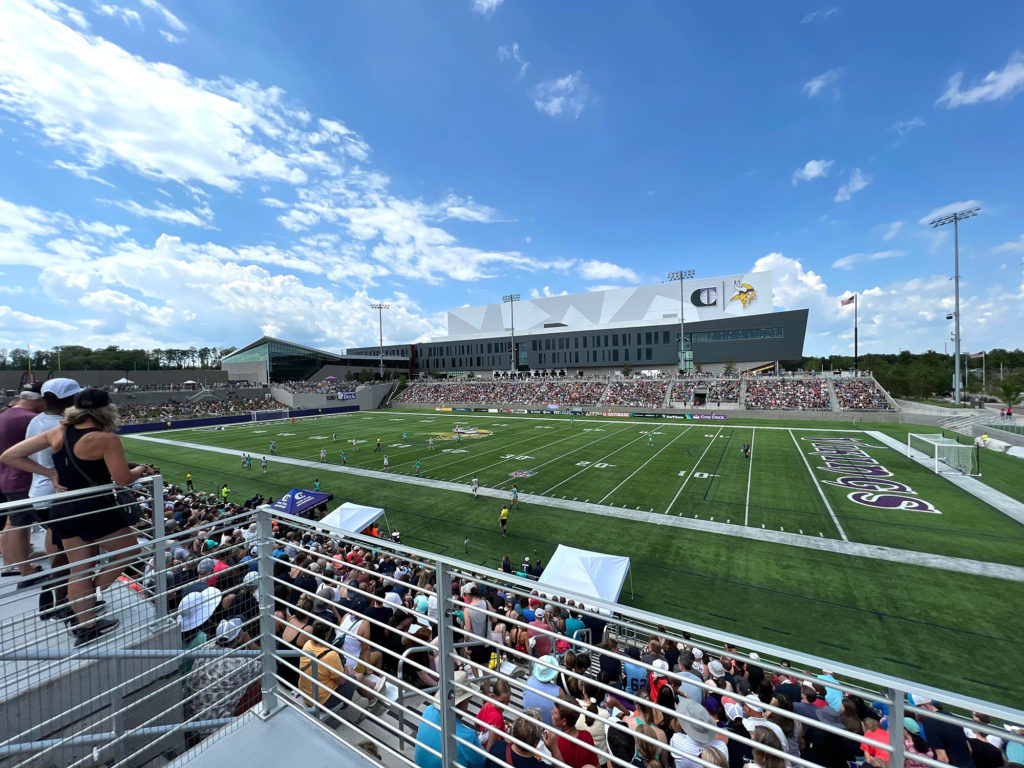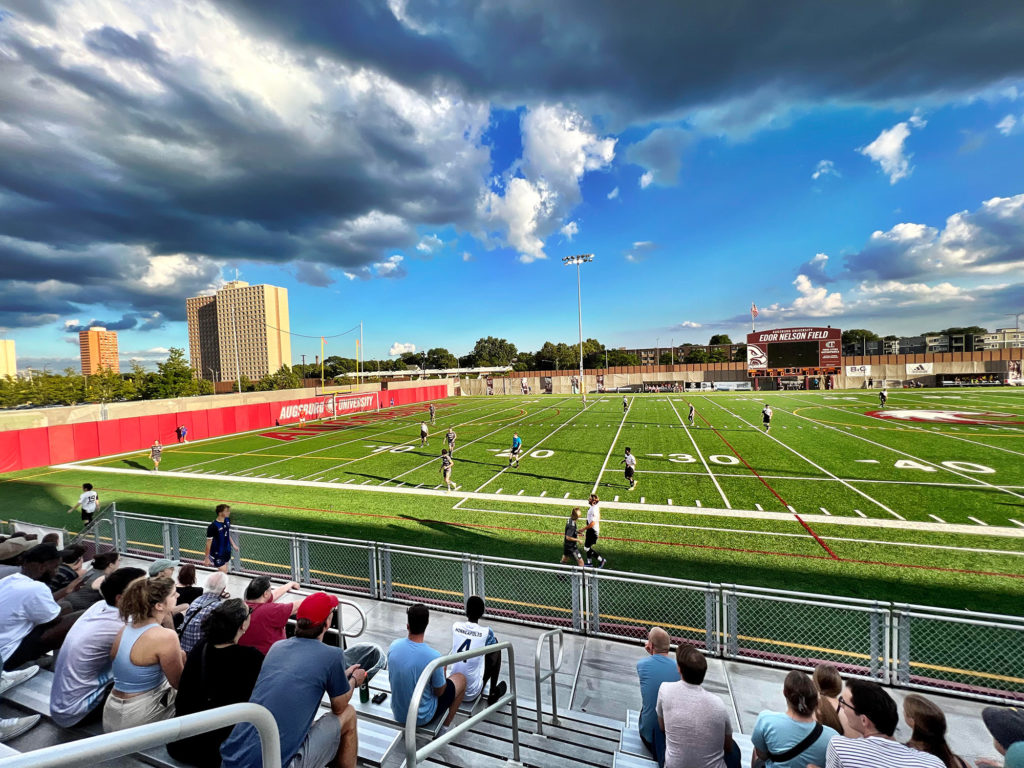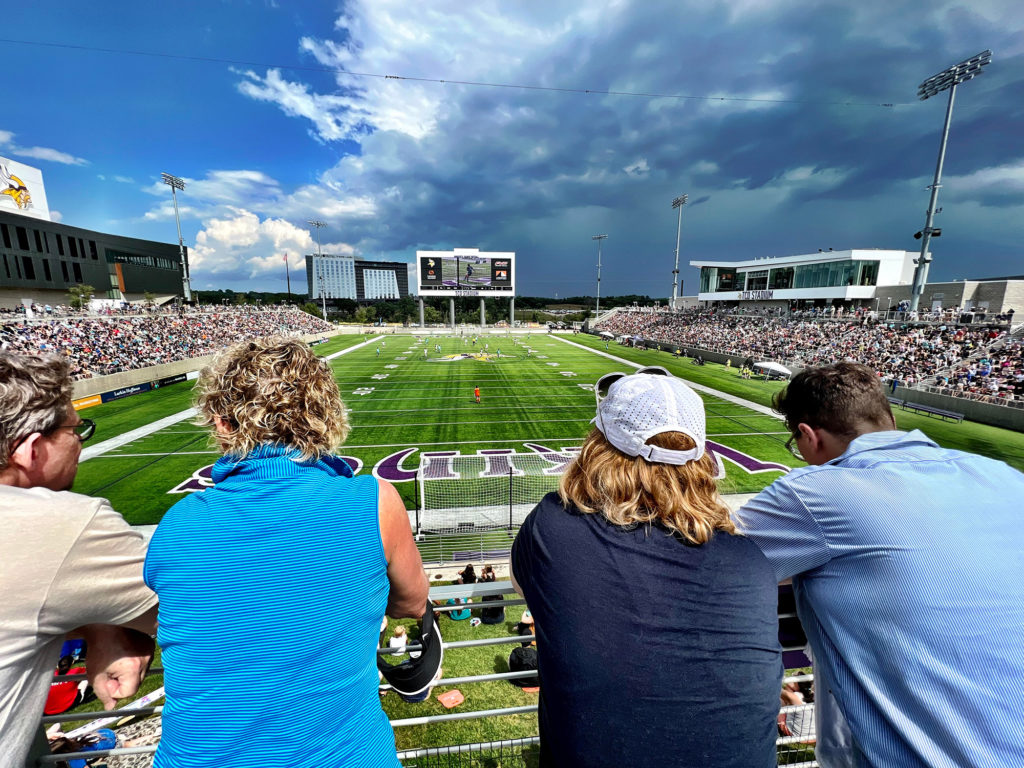
In our tour of U.S. soccer hotspots, we hit Minnesota soccer, where the local scene ranges from notable community support and a groundbreaking women’s pre-pro team to a historic sports complex key in the rise of Minnesota United that still nurtures the Minneapolis-St. Paul soccer community.
(Check out our first article on U.S. soccer hotbeds—San Diego.)
We begin our tour of grassroots Minnesota soccer at an unlikely location: a small private college in the heart of the city. Edor Nelson Field on the Augsburg University campus is a fairly typical athletic field for a Division III school, shoehorned into what serves as the athletic portion of the small Minneapolis campus. Seating 1,400 in bleachers on one side of the field, Edor Nelson Field is home to five Auggies athletics teams.
In the summer, however, Edor Nelson Field is home to the Minneapolis City SC soccer program, fielding both USL League Two and National Premier Soccer League teams as well as youth programs. The two leagues represent pre-professional and amateur play at the grassroots level, with 113 teams in USL League Two and over 90 teams competing in National Premier Soccer League. For the Crows, the team launched as an effort to bridge the gap between the college and pro worlds, focused on Minnesota community support.
What makes Minneapolis City SC notable? The general cheekiness of the team certainly helps in terms of today’s social media: follow Minneapolis City SC on Twitter and you can’t help but note the mix of swagger and insouciance, the quick quips, the certainty of success. The team’s name is the Crows, a reference to the Minneapolis Mega-Murder of crows that winters in the Twin Cities. That social media, connecting directly with fans, is key to the team marketing, a tone perfectly geared to urban dwellers who may be weary of the nonstop marketing totally dominating social media today.
That casual spirit extends to matches at Edor Nelson Field: food trucks provide the basics, a single stand served beverages and pop and another sold the team’s clever merch. No tickets, either. When we purchased a game pass we needed to confirm with the team that no ticket was forthcoming; our receipt was to be shown at the door. The final match of the season yielded a sellout, with much of the crowd looking like regulars.
Minneapolis City SC says it practices DIY soccer, a 501c3 non-profit operating free soccer clinics and other charity efforts, “powered by regular people.” But we suspect there’s more to Minneapolis City SC than pure charity: a ticket purchase was followed up a few days later with a basic survey on our game-day experience, the economics of that experience, and if we planned on returning or purchasing a season ticket. And yes, the play is serious and quite entertaining: a few of the program’s participants (Brandon Bye, New England Revolution and Luke Haakenson, Nashville SC) graduated to MLS.
Yes, we plan on returning.

When Minnesota Aurora made its USL W League debut this summer, no one quite knew what to expect. The women’s game has rightfully expanded in popularity in the recent years, but is still evolving as a business. Not every NWSL team is successful, and when the USL W League launched for the 2022 season, it did so with 43 teams in 20 states, adding two more along the way and more announced for 2023 and 2024.
These clubs debuted utilizing a variety of business plans. Some launched as part of an existing USL team (Detroit City FC, Indy Eleven, South Georgia Tormenta FC, Charlotte Independence), some launched by academies already competing in US League Two (such as Peachtree City’s MOBA Soccer Academy), and some by NWSL teams (Racing Louisville). But most were started by owners of modest means, fueled by their love of soccer.
And then came Minnesota Aurora FC, born of a community investment campaign in late 2021 that ended up fully subscribed, raising $1 million from 3,080 investors in 48 states, eight countries, two military bases, and one embassy. The name and branding came from three finalists presented to the team’s Community Owners, and the team’s venue, TCO Stadium, was announced in February 2022 in conjunction with season-ticket sales.
TCO Stadium is a 6,500-capacity stadium at the heart of the Minnesota Vikings training complex/Viking Lakes development in suburban Eagan. The deal with MV Ventures—the development firm owned by the Wilf family, owners of the Vikings—made Aurora more than a secondary tenant: The partnership includes full access to the locker rooms, press box, VIP areas, concessions and more than 2,500 parking spaces, plus Twin Cities Orthopedics medical facilities and Training Haus next door.
As a soccer venue, TCO Stadium is pretty sweet, with plenty of concessions stands and parking, wide concourses and an end-zone party deck with a local brewery holding naming rights. USL W League venues span a wide range. On one hand we have Racing Louisville’s Lynn Family Stadium, USL Championship’s Detroit City’s Keyworth Stadiumand the multiuse Capital Credit Union Park in Green Bay. And then there are a slew of smaller high-school, academy, and college facilities where the emphasis is on development and participation, not necessarily hordes of fans.
To say Minnesota Aurora raced past expectations and created a winning roadmap to success both on and off the pitch is an understatement. Though the team ended losing the USL W League title after going undefeated into the championship game, the Aurora ended up with a 13-1-1 record and drew 6,489 to the finale after averaging 5,626 per match during the season. In the extremely crowded Twin Cities sports marketplace, the Aurora was the talk of the town at a time when the Minnesota Twins were in first time and the Minnesota Wild saw a resurgence on the floor. The team was solidly profitable—remember, the W League is preprofessional, so no payroll costs—even with renting houses for player accommodations and paying for hotels on the road. Next up: more community outreach and upgraded seating arrangements at TCO Stadium. (More shade is desperately needed.)
Crowdfunding is not new in pro soccer: In 2020 Detroit City FC, then of NISA, sold $1.2 million in “units” of 10 percent of the team to more than 2,000 members of the public. Before that Detroit City raised almost $750,000 in a community reinvestment fund to renovate the team’s home, Keyworth Stadium in Hamtramck, Michigan. Given the past success of Detroit City and the current success of Minnesota Aurora, we are likely to see more in the future.

Much of this would not have been possible without the state placing a bet decades ago on the future of amateur sports and the use of tax dollars to prime the pump. In 1987, Minnesota Gov. Rudy Perpich signed into law legislation creating the Minnesota Amateur Sports Commission, committing $14.7 million toward the construction of the National Sports Center in suburban Blaine.
Perpich was an Iron Ranger who often thought outside the box in terms of the proper role of the state. He was criticized heavily for pushing the 600-acre National Sports Center, both for his assertion that amateur sports represented a solid investment and his belief in the necessity of placing it out in the far suburbs—land was cheap and development would follow.
Since opening, the nonprofit National Sports Center has welcomed 50 million visitors and expanded to a facility featuring over 50 full-sized soccer fields, a golf course, a velodrome, a meeting and convention facility, and an eight-sheet ice arena. In this context the NSC is best known as home to Minnesota United before it moved from USL to MLS.
And also in this context, it’s appropriate to point out there’s a pretty good chance athletes for both Minnesota Aurora and Minneapolis City SC spent time participating in games and tournaments at the National Sports Center. Grassroots community support depends on youth facilities and tournaments at the beginning of the funnel, even if those participants never play past a junior-high team: fans need nurturing too.
